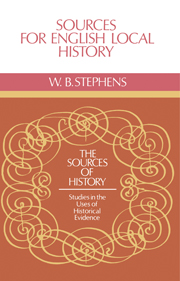Book contents
- Frontmatter
- Contents
- General editor's introduction
- Preface to the second edition
- Preface to the first edition
- Abbreviations
- 1 Introduction
- 2 Population and social structure
- 3 Local government and politics
- 4 Poor relief, charities, prices and wages
- 5 Industry, trade, and communications
- 6 Agriculture
- 7 Education
- 8 Religion
- 9 Houses, housing, and health
- Index
5 - Industry, trade, and communications
Published online by Cambridge University Press: 04 February 2010
- Frontmatter
- Contents
- General editor's introduction
- Preface to the second edition
- Preface to the first edition
- Abbreviations
- 1 Introduction
- 2 Population and social structure
- 3 Local government and politics
- 4 Poor relief, charities, prices and wages
- 5 Industry, trade, and communications
- 6 Agriculture
- 7 Education
- 8 Religion
- 9 Houses, housing, and health
- Index
Summary
INDUSTRY AND INTERNAL TRADE
Before the eighteenth century the records of individual craftsmen or firms are very rare, and local historians must rely on information culled from a variety of sources too wide for all to find mention here. For medieval and modern times evidence for local extractive-industries and for manufactures generally is likely to be found in deeds or charters, especially leases, in manorial court rolls, and in manorial and other financial accounts. Many of these records will be found in local record offices, but since the Crown was so often involved in the control and taxation of industry generally, and more directly with mining and metal working, the collections of such records in the Public Record Office must be tackled by the serious investigator. These include the Classes S.C.6 and D.L.29 (ministers' accounts), S.C.2 and D.L.30 (manorial rolls), and, especially for the aulnage tax on cloth in various counties and the royal mines of Devon and Cornwall, E.101 (Exchequer accounts various). Customs records can also throw light on local industry, as can the Exchequer special commissions and depositions mentioned below, the memoranda rolls, and the ancient correspondence of the Chancery and Exchequer. Not all the other collections at the Public Record Office which may contain information on local industry and trade in the medieval and early modern period can be noted here. For some, however, there are published calendars with indexes, and this will facilitate research.
- Type
- Chapter
- Information
- Sources for English Local History , pp. 122 - 163Publisher: Cambridge University PressPrint publication year: 1981



